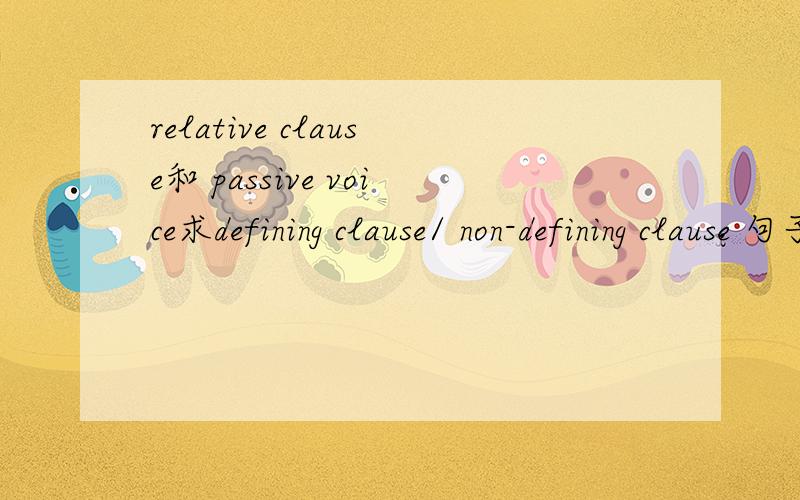relative clause和 passive voice求defining clause/ non-defining clause 句子的构造、用法passtive voice请详细说明,最好有倒子
来源:学生作业帮助网 编辑:作业帮 时间:2024/04/28 17:28:37

relative clause和 passive voice求defining clause/ non-defining clause 句子的构造、用法passtive voice请详细说明,最好有倒子
relative clause和 passive voice
求defining clause/ non-defining clause 句子的构造、用法
passtive voice
请详细说明,最好有倒子
relative clause和 passive voice求defining clause/ non-defining clause 句子的构造、用法passtive voice请详细说明,最好有倒子
defining clause/ non-defining clause
-A defining relative clause gives essential information about the noun or noun phrase it modifies,without which the sentence wouldn't make sense as the listener or reader would not be able to identify the noun in the sentence:
The hotel that we stayed in wasn't bad.('that we stayed in' tells the listener which hotel we are talking about; it defines the hotel)
'Who','whose' and 'that' can be used for people.'Which' 'whose' and 'that' can be used for things.
-A non-defining relative clause gives extra information about a noun or noun phrase and has commas at both ends:
My sister,who lives in France,is coming to stay with me next week.('who lives in France' is not essential,which means that I only have one sister and she does not need to be defined by the relative clause)
'Who' and 'whose' are used for people.'Which' and 'whose' are used for things.'That' cannot be used in a non-defining relative clause.
Passive Voice
A passive construction occurs when you make the object of an action into the subject of a sentence.That is,whoever or whatever is performing the action is not the grammatical subject of the sentence.
Once you know what to look for,passive constructions are easy to spot.Look for a form of "to be" (is,are,am ,was,were,has been,have been,had been,will be,will have been,being) followed by a past participle.(The past participle is a form of the verb that typically,but not always,ends in "-ed." Some exceptions to the "-ed" rule are words like "paid" (not "payed") and "driven." (not "drived").Here's a sure-fire formula for identifying the passive voice:
form of "to be" + past participle = passive voice